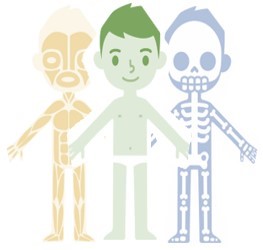AusCP MSK Study: Investigating musculoskeletal health of children with cerebral palsy.
AusCP MSK Study
About the Study
Children with moderate to severe CP are at risk of their hips displacing, developing curvature in their spine (scoliosis), and having a bone fracture. Our project aims to work out if finding musculoskeletal problems sooner can lead to better treatments and reduce the chance of these problems getting worse.
and having a bone fracture. Our project aims to work out if finding musculoskeletal problems sooner can lead to better treatments and reduce the chance of these problems getting worse.
This project is for children with cerebral palsy (CP) who have difficulties with movement and posture that could lead to progressive musculoskeletal (muscle and bone) complications. Children with moderate to severe CP are at risk of hip displacement, developing scoliosis of their spine (a curve) and/or sustaining a bone fracture. Hip displacement occurs when the femoral head (“ball”) moves out of the acetabulum (“hip socket”). Scoliosis is when the spine curves increase. Some children may experience discomfort, muscle tightness, pain and other symptoms when they have severe hip displacement and /or their spine starts to develop scoliosis. Some children with cerebral palsy have fractures of the arms or legs following minimal trauma. This may cause a lot of pain and sometimes the child needs to have surgery to help the fracture heal. Our project aims to find out whether finding musculoskeletal problems earlier can lead to earlier, timely treatments and reduce the chance of them getting worse. Our research team believe that it's better to find a problem early, so we can try to stop it from becoming a much bigger one.
What does the study involve?
Each year over 4 years we will look at a child’s hips, spine, bone strength, nutrition, general health, physical activity levels, and associated health costs.
Assessments at study visits include X-rays, bone mineral density scans (DXA), blood tests, and physio assessments of their joint movements and gross motor skills.
Results from this study may help to guide future treatment for your child and others. The information gained from this study may help select the best treatments for preventing hip dislocation, scoliosis and low-trauma fracture, relieving pain, help caregiving, and improving the quality of life of children with moderate to severe CP across Australia.
What are the benefits of participating in this study?
Participants will receive no direct benefit from participating in this study.
A report of results from each assessment visit will be provided to families to see how their child is progressing throughout the study.
To be eligible to participate:
- The participant is 4.00-9.99 years old at the time of their first appointment
- The participant has been diagnosed with Cerebral Palsy
- The participant uses a walking aid or a wheelchair
- The participant is a current patient of one of the following partner hospitals:
- The Queensland Children’s Hospital (Queensland)
- The Children’s Hospital at Westmead (NSW)
- Sydney Children’s Hospital, Randwick (NSW)
- The Royal Children’s Hospital (VIC)
- Perth Children’s Hospital (WA)
- The participant or their caregiver/s can read and speak English (with or without the help of augmentative and alternative communication or a support person)


